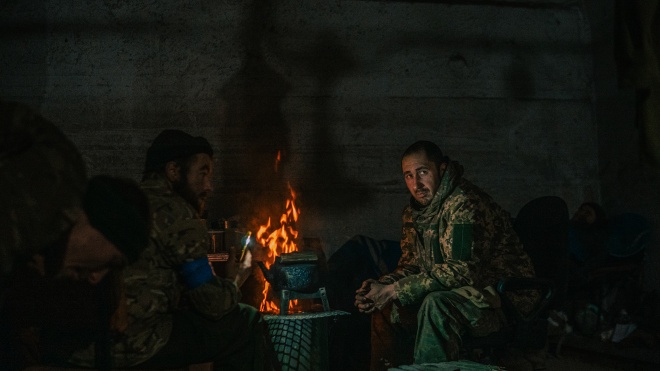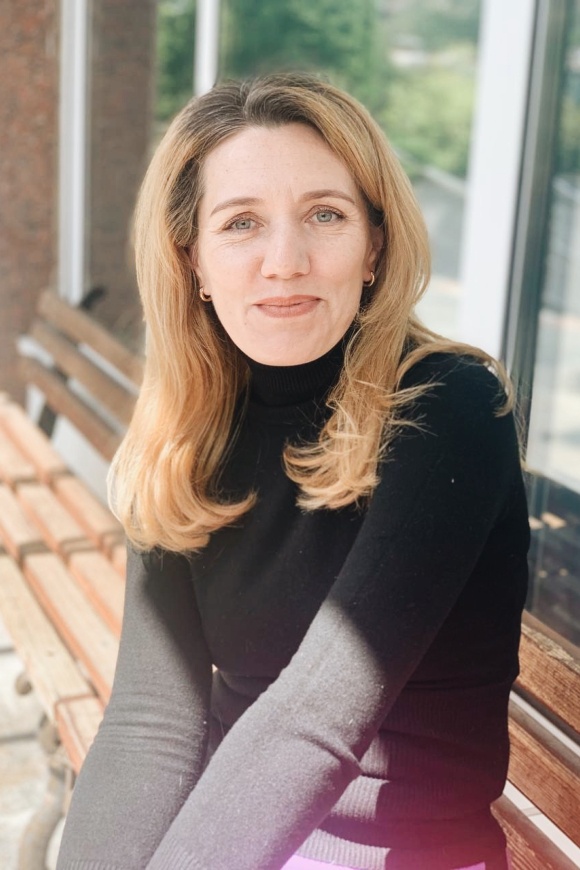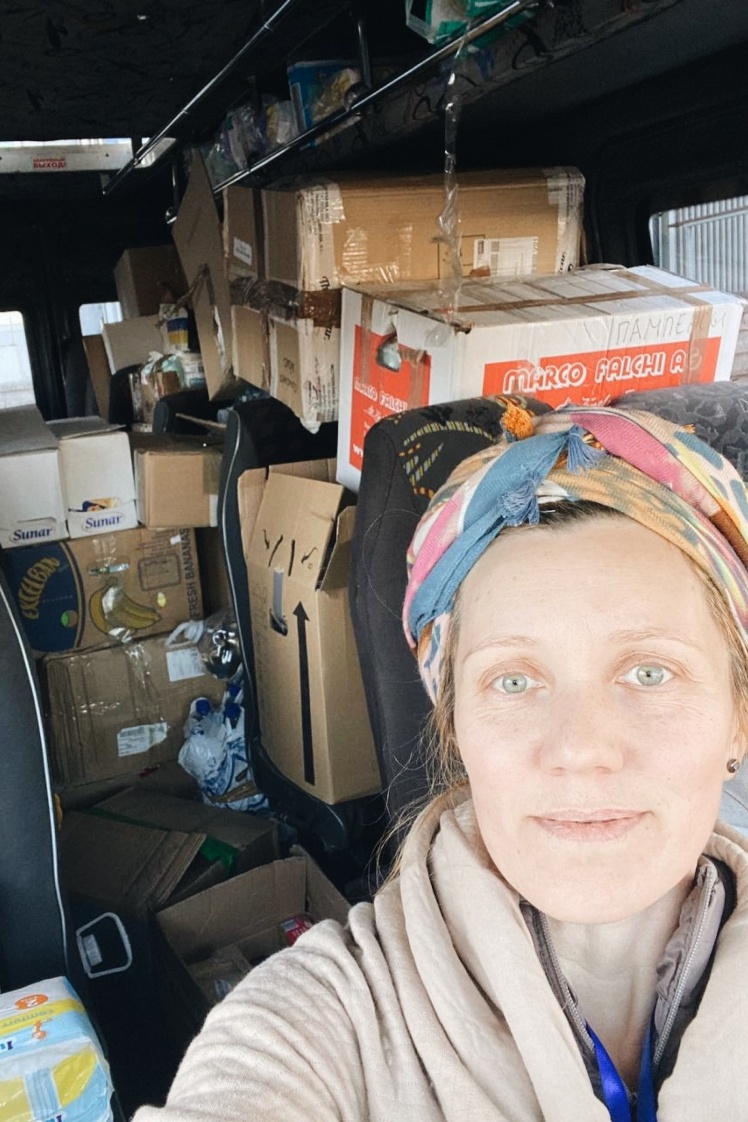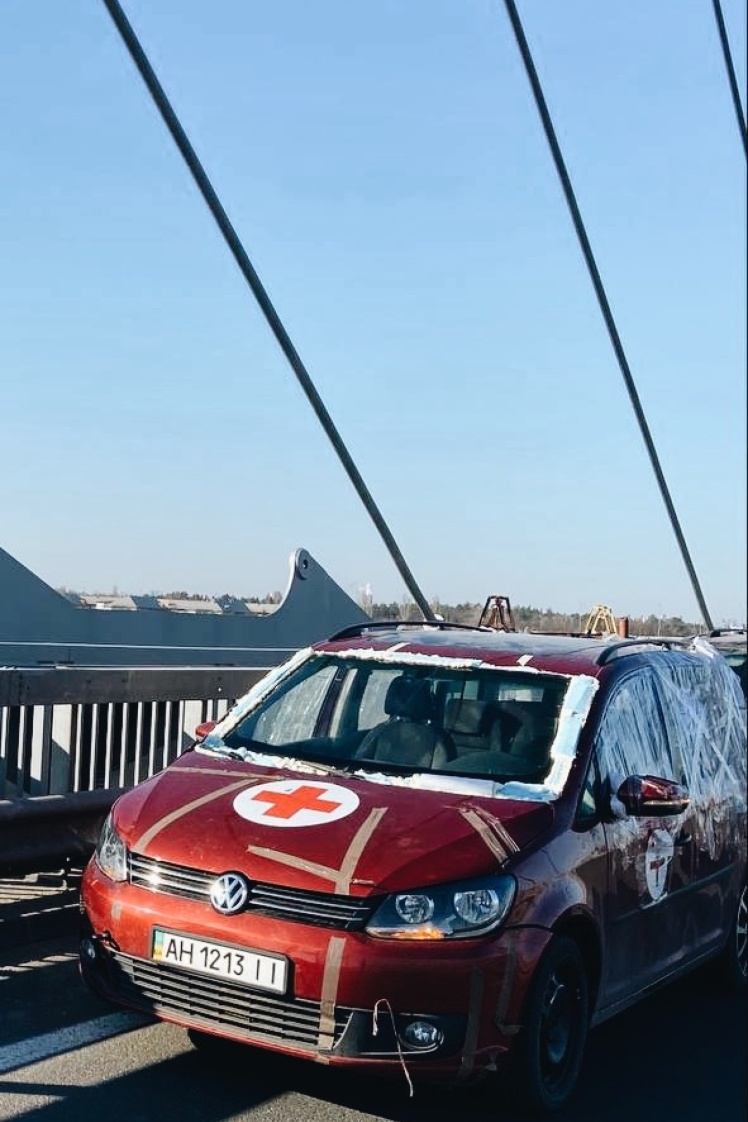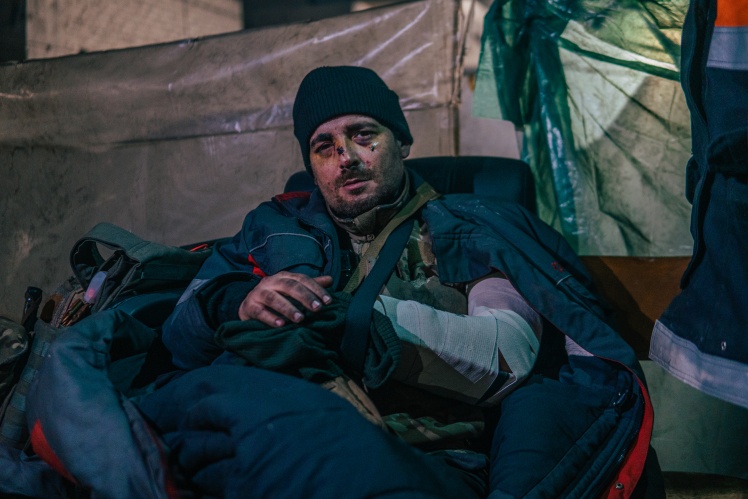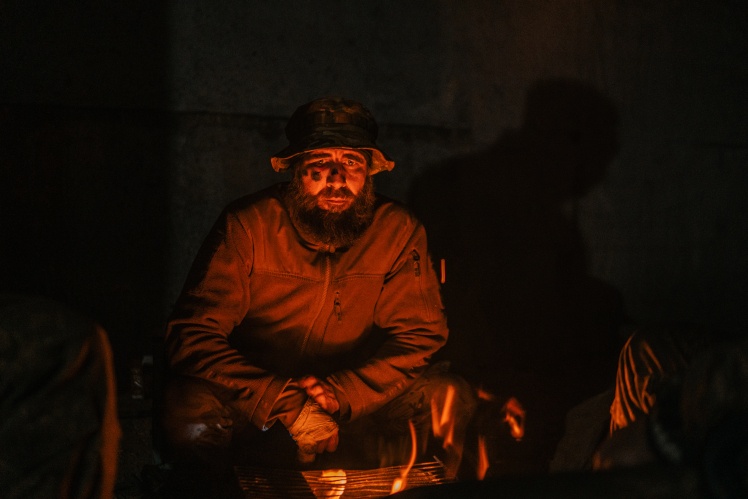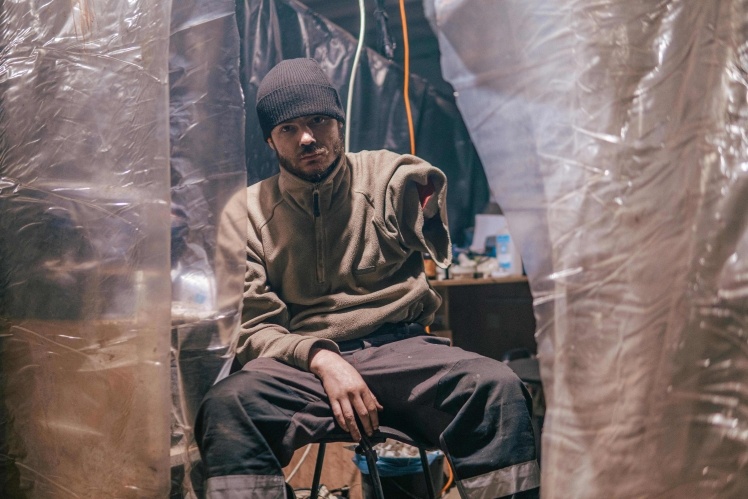1
Until February 24, Anna Vorosheva was known in Mariupol as "Anya who deals with balloons." In twenty years, she turned from a student of two institutes and a school worker into an entrepreneur who was one of the first in the city to start a business of decoration with balloons.
Anna Vorosheva.
Анна Ворошева / «Бабель»
In February 2022, 45-year-old Anna planned a long vacation and the opening of a flower boutique to continue the business of her mother and grandmother. On February 24, she had a ticket to Kyiv — Anna was supposed to visit an orthodontist there, and then fly to have rest. She did not pay attention to the news of the last weeks. However, on the morning of February 24, her daughter called her from Kharkiv and said that the city was being bombed.
The first few days, Anna was shocked, and then she started looking for a car to leave: two of her cars were stuck in a car service. The woman distributed candles, water, and food to neighbors and acquaintances, checked whether everything was okay with certain people whom acquaintances asked her to find out about. A rumor about the evacuation spread through the city, so Anna walked to the drama theater every day. The column of evacuating cars and buses was never released from the city, but Anna met an old friend in line, who had a car that just needed to be fixed. Women settled together in the dental clinic, which was located in the basement, and waited for the right moment to leave.
A stray dog is seen next to a destroyed vehicle as civilians trapped in Mariupol under Russian attacks are evacuated by groups controlled by pro-Russian separatists through other cities, March 20, 2022.
Getty Images / «Babel'»
"My neighbors and I woke up at five in the morning, went to get water, risking their lives, delivered canisters with it to the people, and if there was anything left, we took it to Skhidnyi neighborg," Anna says. “Every day the drivers returned from there with people from whom we learned about the hell in this neighborhood. The driver began to drink heart pills and vodka before leaving, because he just could not see it. Even leaving the shelter to get food and firewood was heroic. In order to have something to eat, we even started looting.”
On March 11, Anna found herself near the explosion of an aerial bomb, the dentistry was destroyed, and the woman decided to leave Mariupol. Her mother refused to leave the city. The next day, together with other volunteers and a friend, Anna went to the outskirts of the city. Although "left" is not quite the exact word: one car was running and pulling another, broken one, on a cable. The broken car was repaired by candlelight in the garage, and on the morning of March 18, they set off on the road with the remaining gasoline. Anna was driving one of the cars.
2
They got to Zaporizhzhia extremely quickly — in six hours they passed several dozens of checkpoints. And all because they chose not the usual road for evacuation, but a different route.
Anna Vorosheva.
Анна Ворошева / «Бабель»
“We arrived in awe,” Anna recalls, “and decided to return for the people who remained at our ʼbaseʼ on the outskirts of the city. There were 36 of them, and we promised to take them away. Moreover, my mother was in Mariupol.”
For the trip to the city, the volunteers had one car, so they decided to buy another bus. The local authorities of Zaporizhzhia, despite the appeal, did not provide transport, so Anna withdrew 134,000 UAH as credit funds from her bank card. In order to raise the necessary amount, she invited a BBC journalist to interview her, during which she told about her idea. Transfers from abroad poured in, and the collection was completed in two days. Other volunteers who drove along the road following Annaʼs instructions confirmed that the road was still clear. At that time, the woman already knew that her mother had managed to leave Mariupol.
Анна Ворошева / «Бабель»
“But people from our ʼbaseʼ on the outskirts called me and said that the fighting was intensifying,” says Anna. “Common sense did not work, only the thought that it was necessary to take away our people was pulsating. Well, not really ʼourʼ — someone elseʼs [close ones], but as soon as we promised to return, they became our own. I could physically feel time passing.”
On the morning of March 25, Anna woke up with the thought that she might as well not go to Mariupol. No one would judge her except herself. Then she, despite her motherʼs protests, asked for her blessing and drove a bus to Mariupol with another volunteer, Andriy.
3
On the twenty-sixth of March in Volodarsk, Anna and Andriy were stopped by the occupiers for the first time and taken to the “militia base", where there were already other volunteers. After a short interrogation, everyone was released, militants asked for food at the end. Anna and Andriy left them some canned goods, bread and butter, and went to Mariupol.
In a few days of their absence, the city changed: familiar roads and streets were no longer there, houses turned into ruins and burned down. The humanitarian aid was taken to large shelters under fire. Locals in broken-down cars helped. They were given gasoline — later they would have to leave together with the busses in the convoy. However, this never happened.
Buildings and vehicles damaged after shelling in Mariupol, March 29, 2022.
Getty Images / «Babel'»
On the twenty-seventh of March, Anna and Andriy took the medicine to the cinema-turned-shelter and planned to return to the outskirts for evacuation. The way back was cut off by the battle, so they chose another road — the one they took to Mariupol.
“We were stopped at the checkpoint in Melekyne, and the trash started,” Anna says. “Just a day ago, we were let through as volunteers, and now we have been detained and accused of profiting from the war and telling the positions of the Russians.”
When the occupiers saw messages about money transfers from abroad in Annaʼs phone, the volunteers turned into "foreign agents." In a matter of minutes, the car was ransacked and mockingly declared that it would be handed over to the “fund of the republic”. But even when the volunteers were taken to the pre-trial detention center in Mangush for questioning, Anna didnʼt believe that she would be detained.
Andriy was sent to a cell filled with previously detained men. Anna, on the other hand, was seated on a sofa for those on duty. However, she was only allowed to go to the toilet at night — in exchange for signing the “document" as “a witness to the search”. On the way to the street toilet, Anna saw her car and, despite the escortʼs prohibition, ran up to it, took out pills, a piece of bread, cheese and a packet of milk from under the seat. She cut up leftover food with a credit card and fed the men through the bars.
The following night, the escort said that the “DPR” had an order to detain the volunteers for “terrorism”. Anna and other detainees tried to pay the bribe to get free, but to no avail. The escort still tried to calm them down — they said that the man will sit for 30 days, and Anna, as a woman, for five to ten days. But he advised to strengthen themselves.
In the afternoon, the detainees were taken to the police station in Dokuchayevsk. Women were put in cells, and men in iron “garages”. Anna ended up in a cell with ex-policemen, a National Guard cook, and a Marine Corps fighter. In the morning, everyone was taken to “UBOP” and called prisoners for the first time. The “investigator” interrogating Anna promised to let her go and began to fill out a paper about successful filtering. But a man came into the office and said that they would not let Anna go. On the advice of the “investigator”, the volunteer left her personal documents in the safe.
“There were 8-10 articles in the document [which I was given to see], the letters were blurred, I could only see ʼterrorismʼ and ʼorganized crimeʼ,” says Anna. “And I understood that they can do whatever they want with me. Shit, youʼre in some kind of movie. You are in prison — it was impossible to imagine!”
Tayra
Анна Ворошева / «Бабель»
The “investigator” allowed her to call her daughter. Anna was placed in the “temporary detention isolator” with the mother of the “Azov” fighter, Mariupol judge Yulia Matveeva and volunteer Tayra. It was Tyra who explained the local rules and said that Anna would probably be taken to Olenivka.
“Tyra told me what it was, and I was shocked,” says Anna.
4
When Anna left the prison truck in the morning, she saw mowed-down buildings with birdʼs nests on the roofs and crumbling walls — this was Olenivka.
The prisoners were taken to the “DIZO”. The men were put against the wall, and the women were taken to cells. There were dirt, the stench of sewage, torn blankets on the door, Russian criminal chanson, shouts from the corridor, incessant ringing of the checkpoint. Frozen Anna sat silently with five other women on two benches. Nearby were a metal table, a toilet-hole, a window made of a metal plate through which rays penetrated. And working lightbulb under the ceiling.
“We had a former policewoman with us, and she knew how to speak in such places,” says Anna. “She started knocking on the door, demanding water and mattresses. She was ignored, but in the evening the “feeder hole” opened, and the escort said to give a plastic bottle for water.
Anna did not drink the dirty water from the bottle found in the cell. She also refused dinner — a dish made of boiled macaroni on a dirty plate with one spoon for everyone. The music was not turned off at night, it was impossible to sleep. And there was no proper place for this. From behind the door there were constant bangs and screams — the women in the cell froze. They were afraid that they would be beaten and raped.
A security guard stands in front of the damaged building of the Olenivka colony.
Reuters / «Бабель»
A couple of nights later, Anna heard from the “feeder hole”:
“Hey, is there anyone?”
“Iʼm here,” she answered briefly.
“Oh, ladies,” said a manʼs voice in surprise. “How many are there?”
“Six.”
“Oh...”
“Can you get boiling water?” Anna asked. Everyone chattered their teeth.
“I donʼt know,” said the voice and disappeared. And in a few hours, a bottle of boiling water flew through the “feeder”.
This is how the women learned that prisoners work in the colony — they deliver water, food, and documents. Every day new prisoners were brought in, and every day there were blows, screams, men fainted. The escorts called Lilia, a captured nurse from the National Guard, to help them. Lilia only had a bottle of Corvalol and a couple of pills. The women asked her to bring pads, but there were none in the colony. She only gave a couple of cigarettes. Anna didnʼt smoke.
The women got to know the escorts. They asked: “boys, give us mattresses, we are girls.” No result. In the yard, the men cooked, sawed firewood and talked with the women on walks — there were six of them in the entire colony at that time. At night, the cooks threw boiling water and onions at them through the “feeder”.
At the beginning of April, the women were offered to move to the nursing home for building materials for the colony, which their relatives would send. There were 18 women, mostly ex-policemen, in that room with a toilet, a kettle and its own yard. Anna and three others were transferred to them.
“And the next day, the deputy head of the colony came and said that no one was handing over the building materials, so five people from the nursing unit had to be evicted back to the cells,” says Anna. “The younger girls conspired to give the five older ones, including me. I sweared at them: they had already been in comfort here, they had to leave soon. And they are policemen! I went to Mariupol to do their work, to rescue people, and they left early because they were warned and told to go to Pokrovsk on February 23, and write applications for dismissal. And now they cannot protect me even in the colony, just by sharing a blanket.”
Interior view of the shell-damaged prison building in Olenivka.
Reuters / «Бабель»
Anna was returned to the same cell. But now it was like a label — “dissatisfied with the conditions”. The escorts did not answer her questions, didnʼt allow to bring provision from the relatives, mocked her. Anna managed to get a mattress, from the nursing unit she brought plastic bottles for water, old pens and medical forms for a diary and notes. Authorities began to feed her better — three times a day a quarter of bread loaf, porridge, soup, a bottle of boiling water regularly was thrown into the cell at night.
5
On April 16, another 44 women from Azovmash and the Ilyich plant were brought to Olenivka. On the first floor, they were given seven cells out of nine. Communication between the prisoners was established through notes and short dialogues. Annaʼs thoughts were occupied only by what can be shared and where to get something.
In a few days, 37 women were taken further. The womenʼs cells were moved to the second floor. Anna watched these changes and waited for her to be released. Apart from her, the only civilian has already been released. There were rumors that everyone would be released “humanely” during the May holidays.
And on April 27, volunteers were called to the headquarters to sign a blank form. In the first days of May, when no one was released from the colony, it became clear that this was a document for the continuation of captivity. The escorts explained — 30 more days for everyone.
Anna Vorosheva.
Анна Ворошева / «Бабель»
On April 30, Anna was called to sign the “protocol” again about how she was detained and that she has no complaints against the “law enforcement officers of the DNR”. Anna objected, a quarrel began. Finally she shouted:
“I havenʼt been in the shower for a month and a half! Iʼm a woman, I have to wash! Try telling your women that they will have periods without pads!”
“Well, we donʼt beat you and feed you, we also live here, what else do you want?” the colony worker snapped.
“You chose it yourself! And I need coffee, champagne and strawberries, I did not choose this life for myself!”
In the end, Anna did sign the paper. But the escort heard the quarrel and, despite the ban, took her to the shower. There was only cold water, but that didnʼt matter. And even after that, Anna was not relieved.
“There was a feeling of hopelessness,” Anna recalls. “In the cell were pregnant Maryana Mamonova and a woman with epilepsy, who was taken to a mental hospital for 20 days and forced her to take some medicine. I hid from the former policewomen with the notes, because they were afraid that if the authorities found something I have, they would punish the whole cell.
Maryana Mamonova and her husband Vasyl at the maternity hospital.
Two National Guard cooks were taken from the cell, one policewoman was released, and Anna was left with two women for a couple of weeks. They received provisions from the relatives and shared soap, shampoo, pads, and cookies with her. It was finally getting warmer outside.
In mid-May, the word “Azov” spread across Olenivka. In a few days, the prisoners were brought. Newly arrived women were immediately offered to take a shower. Others, having learned about it, began to demand it for themselves. In the end, everyone was allowed to shower once every 10 days, for four minutes per person. Later, the nurse handed over torn sheets — “pads”. In May, a single parcel was let to Anna — so she changed her Mariupol ski pants to lighter clothes. And she found a small note from her relatives — everything is fine with them, they love her and are waiting for her. Anna reread that piece of paper and carried it with her everywhere.
6
Anna turned 46 on the 31 of May. On this day, according to the re-signed document, she should have been released. But she was still in the colony and received gifts from other prisoners: greeting notes, cookies, a cucumber, two candies, a chocolate bar, a card drawn hand, and a bar of soap.
On June 7, Anna re-signed the documents again. About the fact that she was allegedly detained on May 30 and only for 10 days. It seemed like it would never end.
On June 9, Anna was taken out to the yard together with the girls from Azov. This meant that she was not released. The head of the colonyʼs operations department briefly said that they were here until the end of the war, and maybe even for the rest of their lives. The prisoners were taken to the headquarters for fingerprinting. Anna couldnʼt stand it there and started talking to the employees of the “DPR” “Ministry of Justice” about the fact that she has been in the colony for 90 days, canʼt sleep, eat, has cigarettes instead of painkillers, that her teeth are crumbling. The workers wrote down the name and promised to check why she was in the colony for so long.
“A few days later, I was transferred to the cell with the women from Azov, and I thought that this was the end and I would not be released," says Anna. Despite the demonization of Azov and torture, the colony had better conditions for them in some ways. “Girls from the regiment received boiling water, shampoo, pads, they cared about the garden, baked bread. For a couple of weeks, the escorts did not swear, because "the girls are here”. There was a window in our cell, we were on duty near it — we watched who was being taken for interrogation and torture. When the Azov were tortured, the music was played louder, but later both it and the alarm bell were turned off. We started sleeping at night.
And in a couple of weeks, new escorts arrived — the most brutal of all. Anna was afraid that they were no longer hiding. It was heard how the Azovians were forced to answer “correctly” during interrogations, how they were beaten and how even the strongest screamed. The doors were not closed in the cells, so the prisoners became witnesses. And how can witnesses be released?
Fighter of the "Azov" regiment Dmytro Kozatsky (positive "Orest"); Getty Images / «Babel'»
7
At the end of June, Anna was transferred to the girls who worked in the kitchen. They managed to get something to the cell, so she stopped starving. A few days later, volunteers Kostyantyn and Ruslan, “office managers”, entered the same cell and asked who knew how to use Excel. Anna volunteered, but Ruslan winked and whispered: “You donʼt need this.”
On the third of July, Anna cried in her cell, mentally begging the “Azovian” who was being tortured to scream and ask this to stop. She recalls that day:
“I understood: tomorrow is 100 days, and I have no more strength. Inside me, everything is already over. The next morning I did not get up at the request of the escort. It didnʼt matter.”
On the fourth of July, Anna heard footsteps in the hallway. Therefore, the escorts called the last name of each volunteer and added: "Take your belongings and go out." Anna rushed to collect her packages and shoved notes into her pockets. She shared the soap in half with the girls, because she did not know where they were being transferred. Her last name was still missing. It was then that a prisoner who worked in the colony looked into the “feeder”:
“Home, do you understand?!” she whispered quickly. “Freedom!”
Anna finally heard her name, left what she could to the girls in the colony, and went out into the corridor with the bags. The men sat on their haunches, looking from under their foreheads and smiling. During the search, Anna spoke her teeth to the escorts, and they did not notice the notes in the bags and pockets.
Anna Vorosheva.
Анна Ворошева / «Бабель»
Thatʼs how she left the colony — after 100 days, with a piece of paper stating that she was detained on June 6, and on June 14, the “DPR prosecutorʼs office” allegedly refused to open a criminal case against Anna and the rest of the volunteers.
8
“It seemed that you would never forget it, but now..." Anna laughs when she cannot remember the exact dates.
I donʼt see her — I only hear how she puffs on a cigarette over and over again and how she clucks the lighter for a new one. Anna did not smoke before the colony, but cigarettes were the only salvation from toothache there.
Now she is with her mother and daughter in the Netherlands. With the head in paperwork and interviews. There is no time to take care of health. Anna lists the consequences of captivity: broken teeth, arrhythmia, thickening of the thyroid gland. She was examined in Kyiv, but help wasnʼt offered. Anna has no money for this — she gave the last for evacuation bus.
Анна Ворошева / «Бабель»
“Itʼs such a disappointment... Iʼm like a deflated balloon now,” says Anna, and I remember how she used to talk about herself at first, “Anna with balloons.”
She was captured because of her desire to help others. It also gave her strength behind bars.
“This is the same thing that saved me back in February. If I can give something back, give people joy and hope, then this is my strength.”
Translated from Ukrainian by Anton Semyzhenko.
Letʼs wait for all those released from captivity together — support Babel: via Patreon 🔸 [email protected]🔸donate in cryptocurrency🔸in Ukrainian hryvnia.
